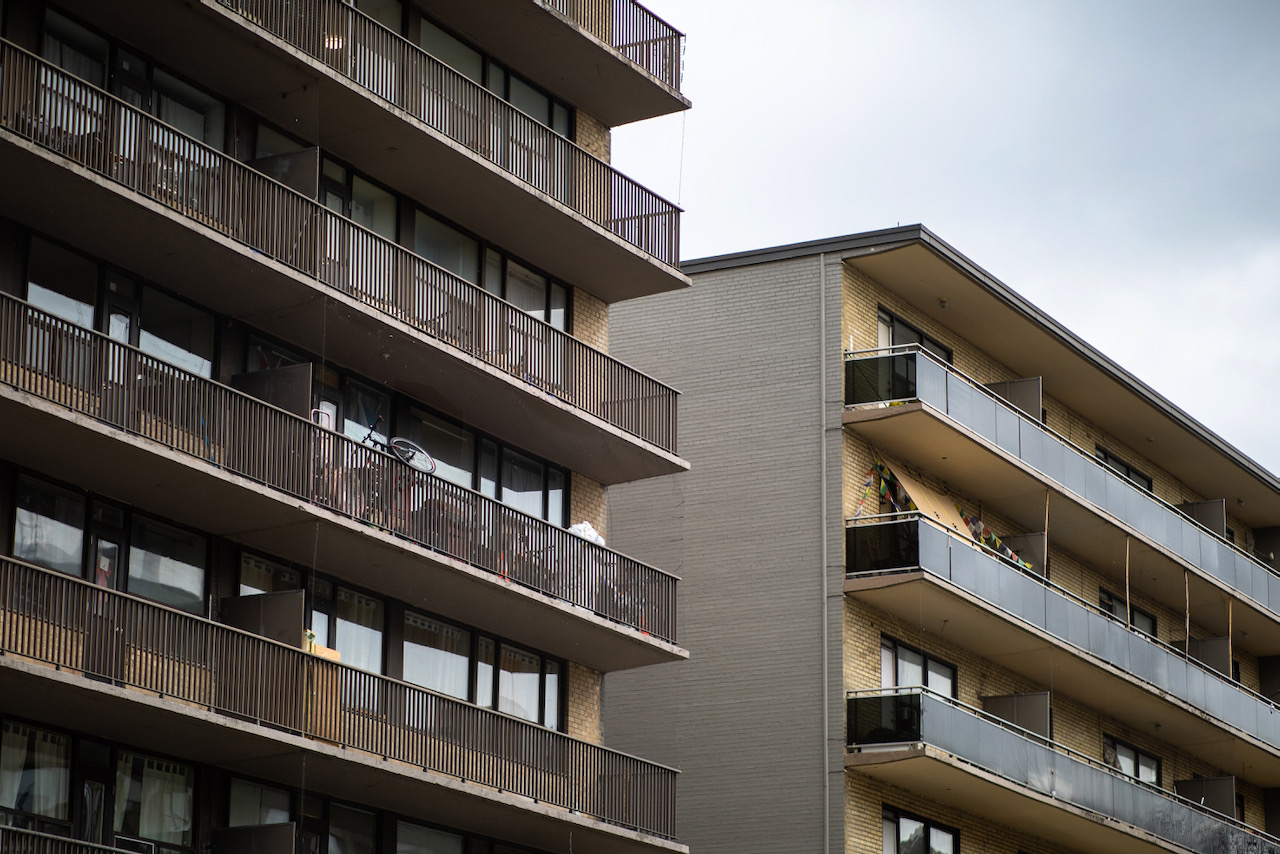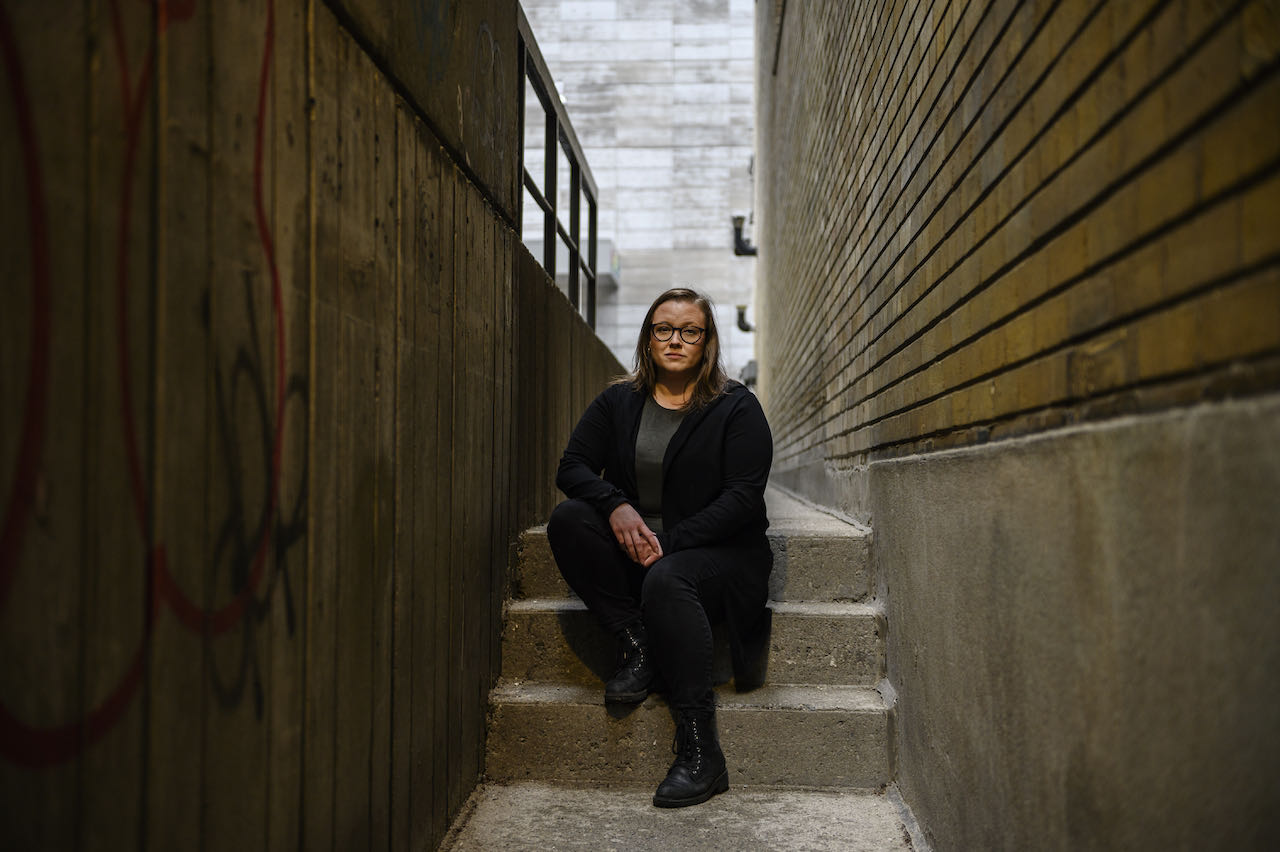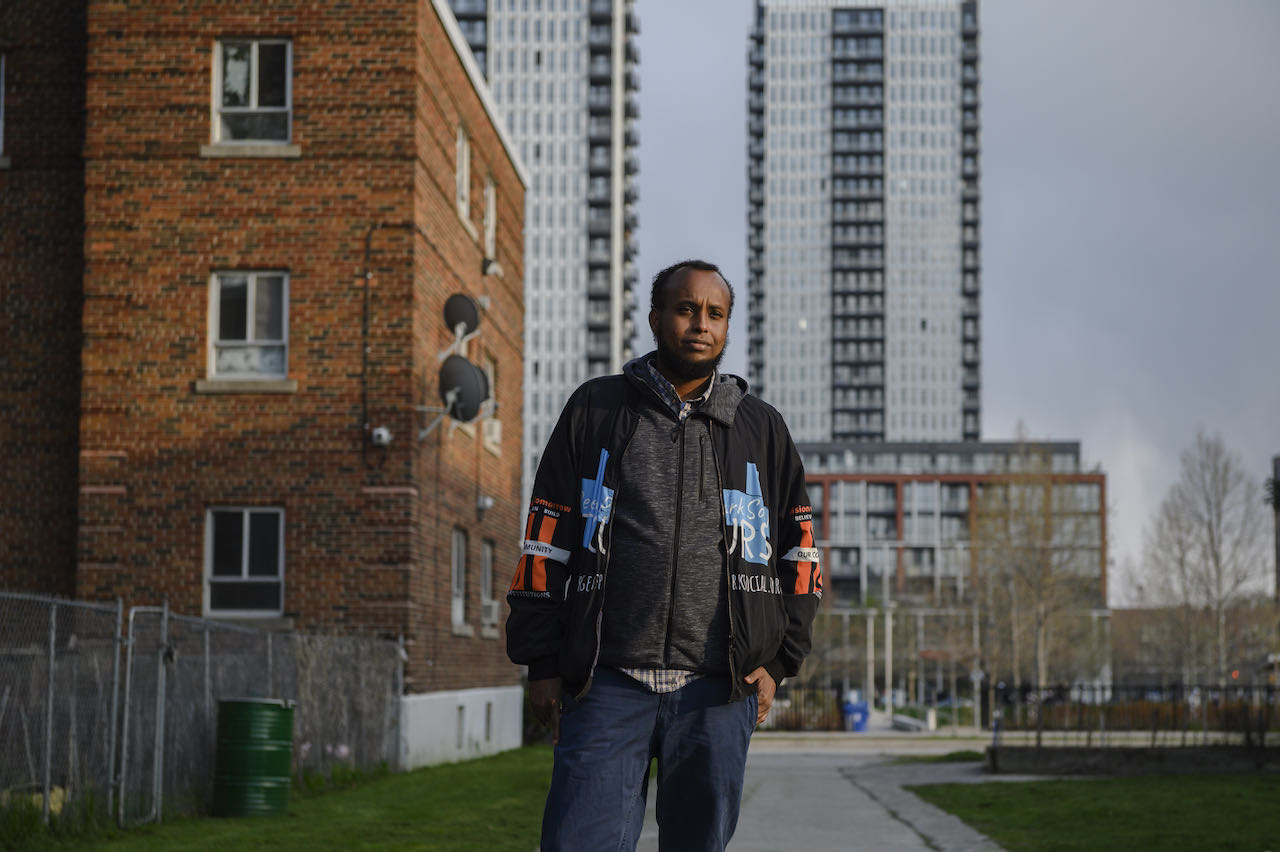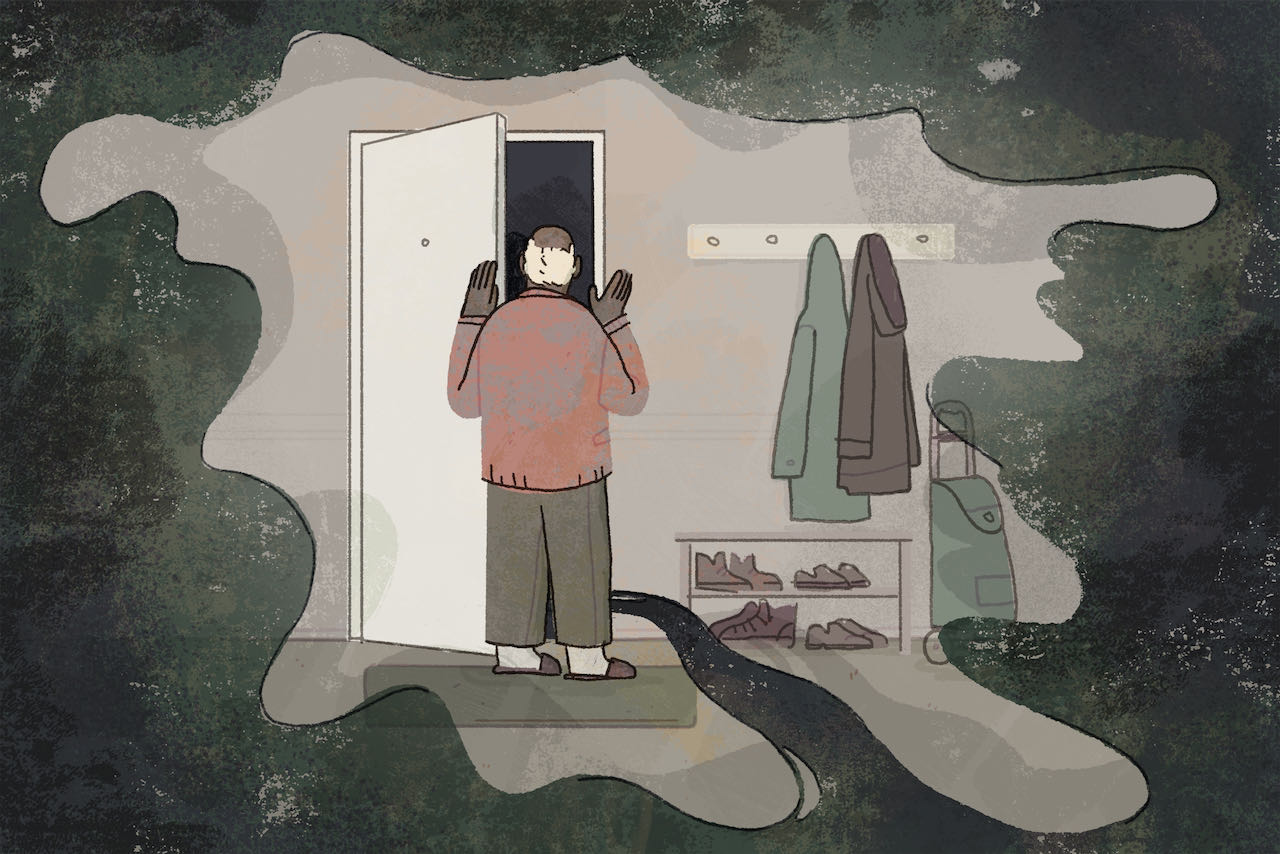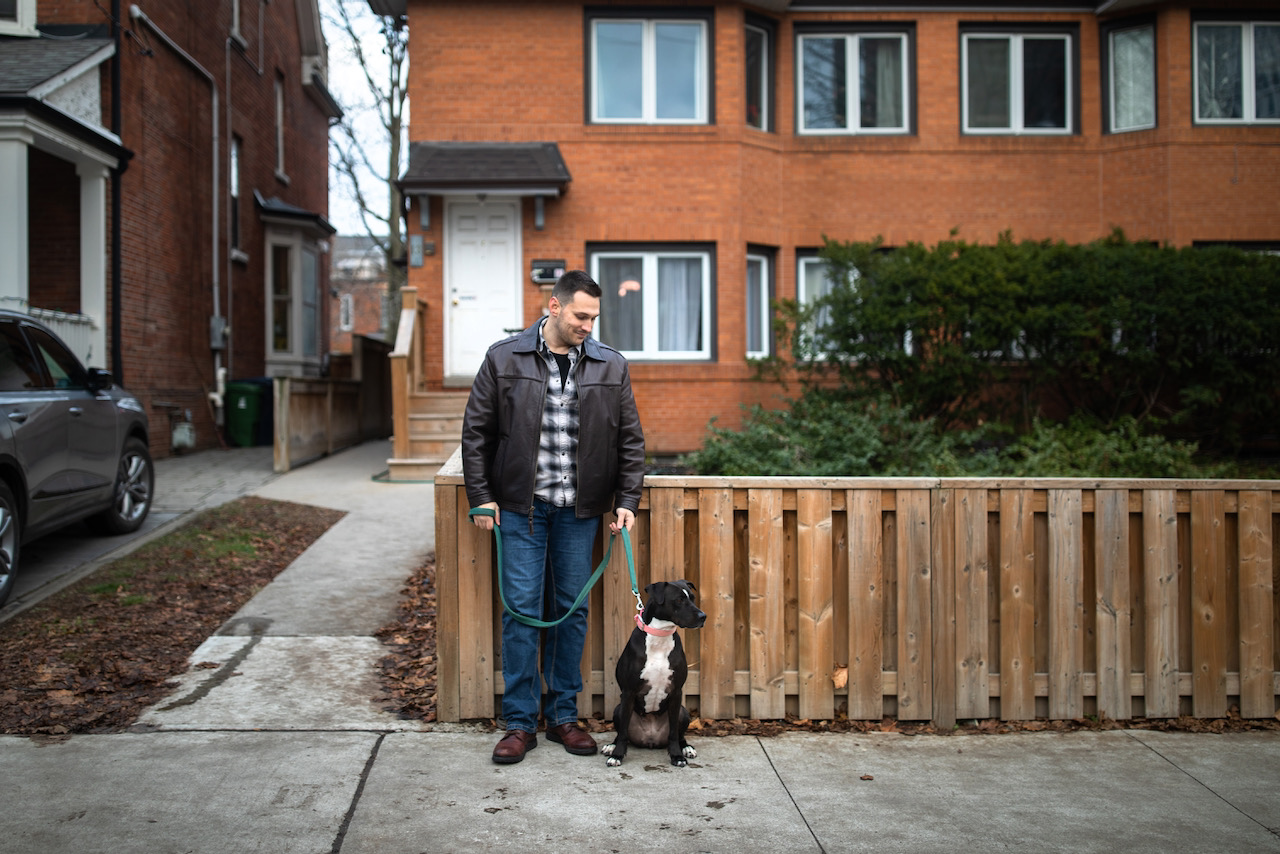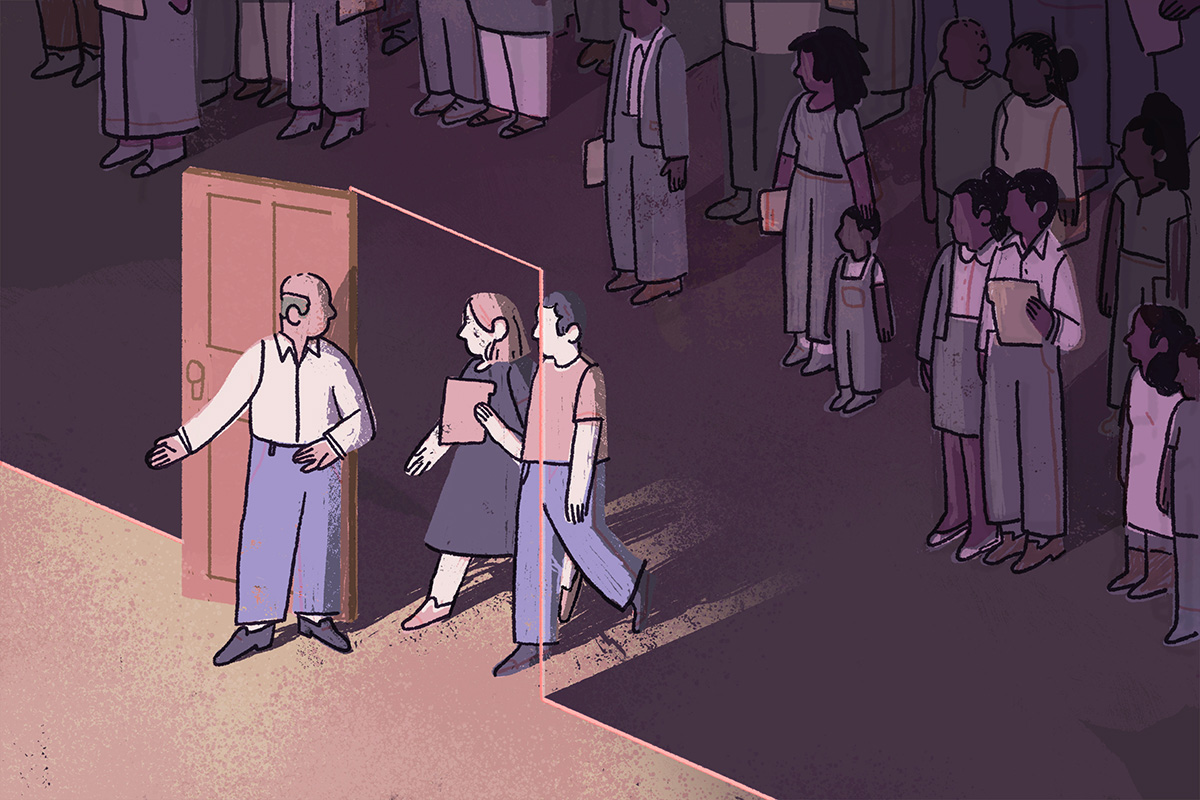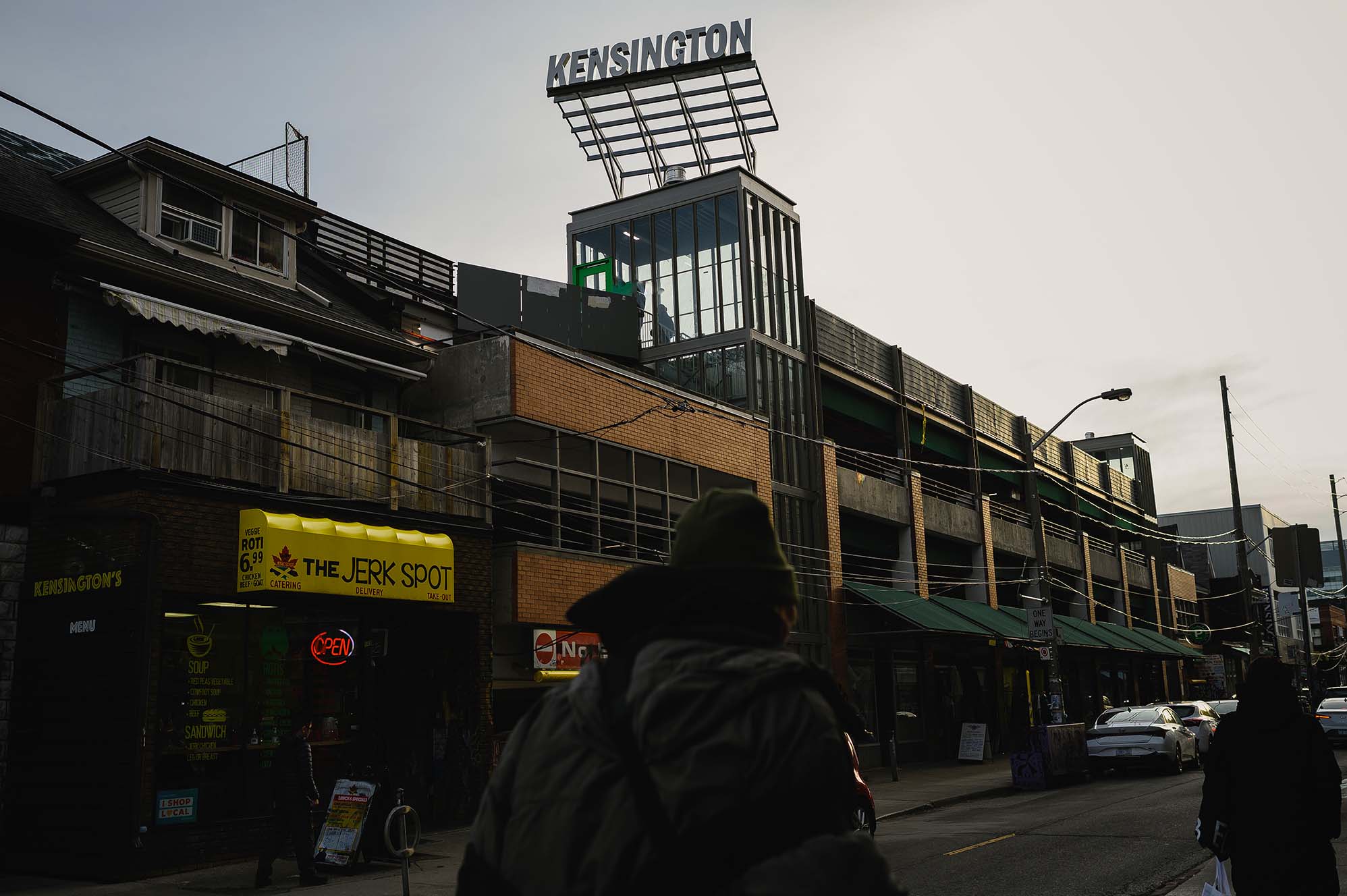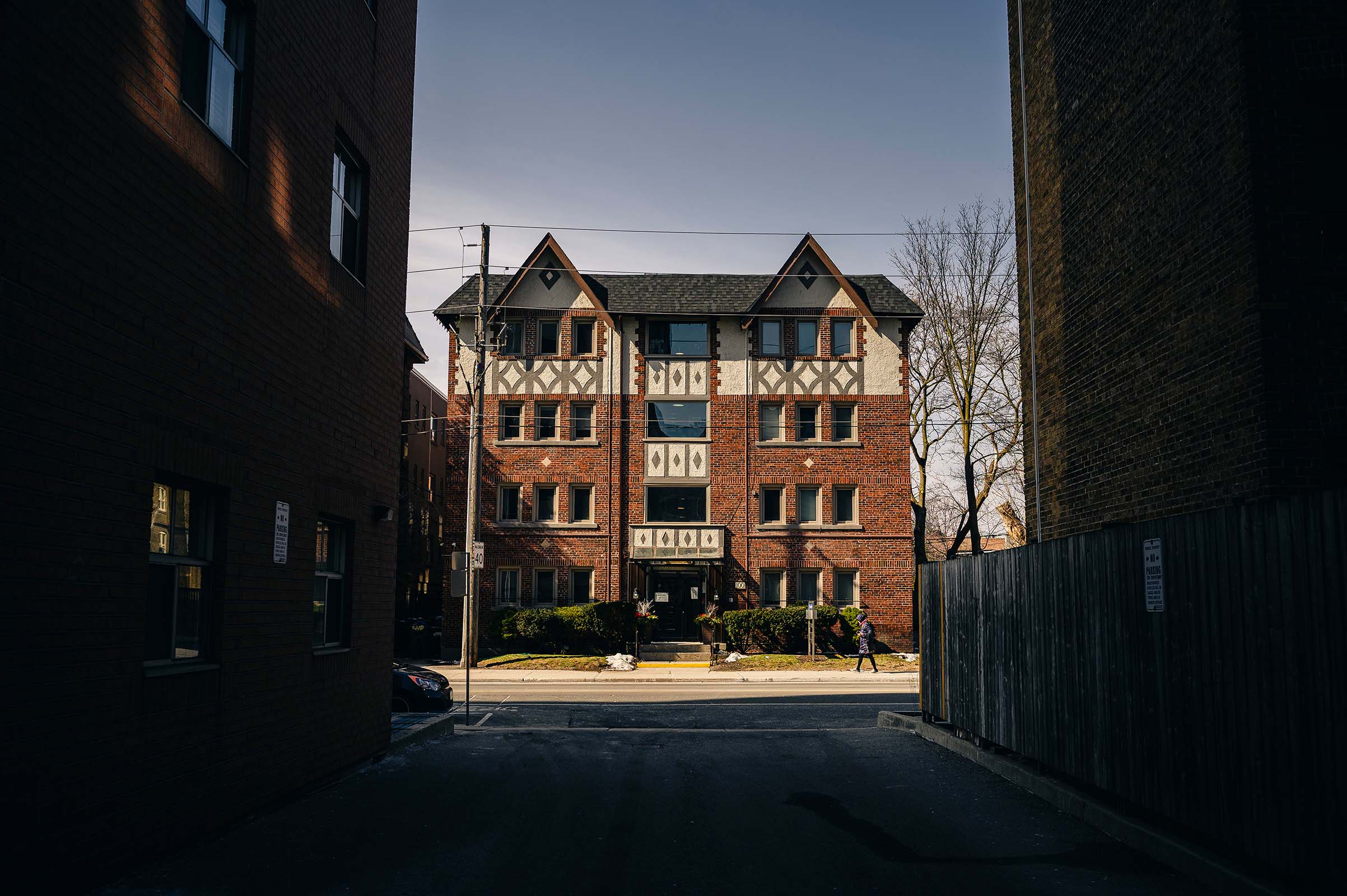

Senaa Ahmad and Erin Taylor’s case with the Landlord and Tenant Board wasn’t supposed to take this long.
The pair are organizers with the tenants’ association at 100 Vaughan Road, a four-storey apartment building just north of St. Clair near Bathurst. They joined their neighbours in a case against their landlord in February 2021, after their building only had scalding hot water for three months because of an unresolved plumbing issue. At the time, the Ontario Landlord and Tenant Board (LTB) target was to schedule tenant cases for a hearing within 30 business days. The tenants at 100 Vaughan Road have been waiting for two years.
In that time, Ahmad says, four of the 11 tenants that filed together have moved, one of them a long-term resident who “specifically cited the landlord’s poor behaviour as the core reason for moving out.”
A preliminary hearing was adjourned a year ago because the Board mistakenly split up the case between the constituent units. The presiding adjudicator said their cases would be joined together and heard collectively, but there haven’t been any updates since. While the Board wasn’t established to harm tenants, the delays and radio silence certainly make it feel that way, Ahmad says.
Since the pandemic, both tenants and landlords have experienced delays of several months while the LTB schedules their hearings. But new analysis by The Local reveals that tenants are being disproportionately affected: in the last nine months of available data, average wait times for tenant cases were up to seven months longer than for those brought by landlords. Tenant advocates say these longer wait times are caused by the LTB prioritizing landlord cases, which the Board views as simpler, in an effort to reduce a backlog of cases. When tenants do eventually get a hearing, they struggle with an online system that favours the technologically literate and a new crop of less experienced adjudicators. With delays growing, and the LTB failing to increase its resources to meet demand, thousands of tenants are left waiting for justice.
The LTB publishes the average time it takes each type of case to be processed, from the initial scheduling of a hearing to the issuing of a final decision. Analysis by The Local found significant disparities between wait times for evictions (the most common landlord applications) and tenants rights violations and lapsed maintenance cases (the most common tenant applications).
That disparity predates the pandemic. From October to December 2019, tenant cases took 96-108 days from start to finish, whereas landlord cases took an average of 47-65 days depending on the type of eviction.
But delays have ballooned since then: from January to March 2022, the last period for which data is available, tenant cases took almost an entire year to process, while landlord wait times didn’t cross the six-month mark, averaging 113-153 days.
The LTB is a year behind on sharing data, and is expecting to release last year’s figures by the end of March.
Dania Majid is the director of the Tenant Duty Counsel, the publicly funded program that provides legal representation for tenants in need. She says The Local’s analysis supports the problems her team has noticed for years. “Early last year, the Board wrote to stakeholders to say they would be increasing efforts to schedule tenant applications in a more timely fashion,” she says. “The data suggests that this is not happening.”
Tenants only compose up to 16 percent of all LTB applicants in the last three fiscal years, which Majid says is in part because the delays act as deterrents. “We know tenants generally don’t over-apply […] Many of them know they can but choose not to because of the hassle. So when a tenant actually proceeds, it’s usually [crossed] some sort of breaking point for them.”
Legal clinic lawyers say one of the main reasons for the difference in wait times is the way landlord cases are treated. While landlords can argue their case for evictions based on financial statements and bounced cheques, tenant applications often require more subjective evidence to prove a landlord’s negligence or harassment. Benjamin Ries, a tenant representative since 2010, says landlord hearings can be resolved in “as little as 10 minutes,” giving the LTB strong incentive to prioritize them—which the LTB did late last year to widespread criticism.
“The more complex cases are really, really dragging through, because they’re trying to close as many cases as they can, as fast as they can,” says Elysha Roeper, a lawyer with the West Toronto Community Legal Clinic.
Tenants who apply are often in dire straits already, and the shortage of affordable housing in Ontario makes it difficult to find another place to live. Long wait times can compound these harms. For Ahmad, the wait is especially disheartening because she’s been through it before. In 2018, she and her neighbours successfully stopped a rent increase by appealing to the LTB. The process took just a few months.
Delays to the process matter because the LTB is the primary recourse for housing justice for Ontario tenants. It can fend off predatory landlords, quash illegal rent increases, and demand building management make their units liveable. Any tenant (or landlord) can bring forth a case, with no requirement to hire legal representation that might impose unaffordable costs. The LTB’s function is to make the ideals of safe housing enforceable—it’s an essential part of Ontario’s legal system.
Which is why the delays are being taken seriously. They’ve made headlines and prompted advocacy groups to issue reports on the consequences. Tribunal Watch Ontario, a watchdog group for all of Ontario’s issue-focused tribunals that supplement the courts, has sounded the alarm repeatedly, calling the crisis “unprecedented.” The provincial Ombudsperson has also been investigating the delays for three years and received some 1800 complaints over that time.
“We recognize there continue to be delays and that more needs to be done to meet service standards,” the LTB said in a statement to The Local. “Applications filed by tenants tend to be complex matters requiring lengthy hearings. Efforts were made over the summer and fall of 2022 to focus on older tenant files and further progress is anticipated in 2023.”

The long wait times are just one hurdle in a process stacked against tenants. Many tenants represent themselves because they can’t afford to hire a lawyer, absorbing the time and energy costs of navigating legal bureaucracy. The lucky ones get represented by publicly funded community legal clinics, where overstretched staff have to make difficult choices about who to help in their limited time. Requests for representation are often denied because clinic staff are just too busy; they can only offer advice and hope everything works out.
Larger societal inequities are predictably magnified before the LTB. Aruna Boodram sees this every day as a paralegal for the South Asian Legal Clinic, one of a handful of community legal clinics tasked with serving specific communities.
As the “youngest clinic in the system” and the only one serving the South Asian community specifically, Boodram and her small team of eight work with low-income people from across the GTA and Ontario. They provide translation services when they can, often for older, low-income tenants—“aunties and uncles who have been living in someone’s basement in really bad conditions because no one’s fixing things,” as Boodram puts it.
By contrast, landlords can show up with a “whole arsenal of legal representation,” including experienced lawyers or paralegals who know how to hector tenants to get what they want.
Boodram has faced down aggressive paralegals countless times herself. “Can you imagine how they’re talking to a seventy-year-old Tamil auntie who has no idea what the hell they’re saying?”
These barriers have worsened since the hearings moved online during the pandemic. Whereas previously in-person hearings were held at local LTB offices across the province, all applicants now have to attend Zoom hearings. The LTB is supposed to schedule in-person hearings upon request, but Majid says she has heard of hundreds of requests, and only two successes.
The online hearings lump cases together by type, not origin. During these hours-long Zoom calls, tenants and landlords have to stay on the call until their turn. Advocates say the wealth disparity between landlords and tenants is apparent in these hearings, where landlords Zoom in flanked by their representatives, while tenants attend from dimly lit rooms or hallways, or call in when they are unable or unwilling to use Zoom’s video function.
Majid says Tenant Duty Counsel lawyers and paralegals could help far more easily during in-person hearings. Regional hearings meant that any Duty Counsel staff present were allowed to represent any tenants who needed impromptu aid. Tenants could stand at the edges of conversations and listen in or ask for a quick word of advice when a representative was free. This is almost impossible when lawyers and tenants have to speak in private breakout rooms, the only way to prevent both the adjudicator and opposing party from hearing their strategy.
In-person, tenants would come with shopping bags full of evidence and photographs they could study with their lawyers. Now everyone is stuck with the LTB’s buggy online portal that makes evidence sharing difficult, especially when tenants call into hearings with non-smartphones that can’t send documents via Zoom chat or email.
Hearings attended by The Local confirmed these descriptions. In one instance, an applicant representing themselves was bumped from one legal clinic lawyer to the next, adding delays and eventually being forced to drive to their lawyer’s office with hard copies of their documents because they couldn’t share access to the online portal.
All of this is draining for lawyers too. “What we have heard when we speak to Duty Counsel is that everyone is burnt out to the max,” Majid says.
“[Lawyers] have to convey a lot of complicated information to a tenant who has mental health issues, may not be able to speak English, who’s having a meltdown, and they’re supposed to understand everything [the lawyers is] saying and then repeat it at the hearing, where there’s going to be a lot of noise and distraction… and you might have an impatient adjudicator as well.”
The situation has broken down to the point where the Advocacy Centre for Tenants Ontario, which houses the Duty Counsel program, is helping tenants take the LTB to court. In June 2022, they announced they were representing some tenants before the Human Rights Tribunal of Ontario, claiming the failure to provide an accessible process was a human rights violation.
To get a sense of the online system, The Local asked the LTB for scheduling data over the past few years, but did not receive a response—so one transparency activist’s Twitter became the key source of that information.
Until late 2022, the Twitter account @LTB.info shared weekly public hearing links the LTB emailed out. By gathering the information from these emails, and filling in any missing weeks with hearings posted by a Facebook group called Landlords and Tenants of Ontario, a clearer picture of the scale of the LTB’s online system emerged.
Tribunals Ontario’s 2021-22 report shows the number of LTB adjudicators hovered around 70 from mid-2021 to late 2022. (The LTB did provide figures to The Local that were slightly higher due to recent appointments, but clarified they were a snapshot and not representative over time.) At the same time, the number of hearing blocks per week has steadily grown from a median of 10 in 2011 to a median of 40 in 2022. The number of hearings per block varies, Majid says, but a week heavy on landlord applications will have around 200 hearings a day in total. This suggests that the LTB is attempting to do much more with the same resources—the number of hearing blocks per adjudicator in December 2022 was up 4.5 times from the same time in 2021, according to The Local’s analysis.
Majid and all three clinic lawyers who spoke to The Local also claim that some of the newer batch of adjudicators are less equipped to handle complex cases, dragging them out and causing adjournments. This started when many of the experienced adjudicators didn’t have their contracts renewed after the provincial Conservatives came to power. Ries says there are only a handful of adjudicators left who he knew from before. According to the public profiles of sitting adjudicators, a spate of new hires have come from public service, business, policing, real estate, or other professions, instead of law.
Clinic lawyers say they’ve witnessed this themselves. One says she’s had to explain legal intricacies to adjudicators in a way she didn’t before. Roeper says there are more procedural violations, fewer chances for lawyers to ask questions. “I believe when I’m before [experienced adjudicators], we are trying to reconstruct that previous experience that’s now fading further and further into memory,” Ries adds.
Alex, a former adjudicator who left shortly before the pandemic, faced similar challenges. (The Local is granting them a pseudonym because they still occasionally present before the LTB.)
Alex came to serve on the LTB in 2019 after years of experience as a community legal clinic worker. As a new member, they reviewed several decisions they believed were “not legally correct,” leading them to question why their fellow adjudicators had been hired.
“I’m sure they came with other skills that were transferable,” Alex says. “But when I was there it didn’t seem like enough focus was on having a legal background and understanding of the [LTB] and what it does.”
Previous reporting has claimed that inexperienced adjudicators are hired because of their political connections rather than legal expertise. Tribunal Watch is one of the leading advocacy groups supporting this theory. They provided The Local with nine senior appointees to various tribunals other than the LTB whom they claimed had affiliations with either the PC party or the federal Conservative Party. In six instances, The Local was able to verify their connections, as minor donors, ex-political staffers, and election candidates.
Gary Yee, an executive of Tribunal Watch who has been outspoken about the politicization of tribunal appointments, says limited legal experience can be compensated with training, but politicization is the bigger issue. “When you have this kind of pattern, then unfortunately it smears every member who is appointed and has PC connections—even if they have merit.”
In the face of a crumbling LTB infrastructure, tenants are turning into activists, filling in the gaps where they can. Carl, the activist behind the @LTB.info Twitter, has been dealing with the LTB’s lack of communication since he started his Twitter account. (Carl is using a pseudonym because he is precariously housed and concerned about reprisals.) Hearings are required by law to be public unless there is a specific privacy concern—attending them is a right, and a valuable experience for activists, advocacy groups, journalists, and other applicants.
But when Carl started emailing the LTB in the spring of 2021 to attend upcoming hearings, he found them difficult to work with. He was redirected from department to department, his queries went unanswered, and sometimes he was even asked why he wanted to attend.
The Twitter account became a resource for activists and the public, but grew unsustainable for Carl to manage. In the course of running it, he was evicted from his home in Kensington, and is now precariously housed. He also has fibromyalgia and can only work part time, so he relies on disability support for much of his income. Spending hours each week painstakingly posting each Zoom link was wearing him down.
Ironically, Carl is exactly the kind of tenant most affected by delays and poor access to hearings: precariously housed, with accessibility needs and limited means to hire an expensive lawyer should he need one. The LTB should be supporting him, not the other way around.
In December, he put the project on pause. He’s not sure it will come back. “I would love to see it continue, but in the end I just did what I could do,” he says. “It’s not my responsibility… it shouldn’t be just one weird little dude running this shit.”
That sense of resignation is familiar to many of the tenants who bring a case before the LTB. Ahmad and Taylor at 100 Vaughan Road recently requested their case be expedited, to no avail. “Any level of clear communication at this point seems crucial,” Ahmad says. They won’t drop their case—they’ve put in too much to give up now. But as their wait has passed the two-year mark, the possibility of justice in any meaningful sense has passed. Now they’re just hoping for an email.
Correction—March 22: A previous version of this article incorrectly identified Dania Majid as Dania Murad, and misstated her title to be executive director.
Correction—March 24: A previous version of this article mistakenly referred to Tribunal Watch Ontario as Tribunals Ontario
Our Rent Series is made possible through the generous support of Maytree. All stories were produced independently by The Local.


